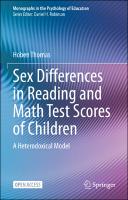Sex Differences in Reading and Math Test Scores of Children
A Heterodoxical Model
| dc.contributor.author | Thomas, Hoben | |
| dc.date.accessioned | 2023-10-13T15:44:14Z | |
| dc.date.available | 2023-10-13T15:44:14Z | |
| dc.date.issued | 2024 | |
| dc.identifier | ONIX_20231013_9783031412721_32 | |
| dc.identifier | OCN: 1403275451 | |
| dc.identifier.uri | https://library.oapen.org/handle/20.500.12657/76749 | |
| dc.description.abstract | This open access book examines why reading and math test scores for boys and girls have differed since the origins of testing in the United States. It details the pattern of differences that have remained largely unchanged for more than 100 years in the United States and worldwide. The book explores why boys have modestly larger math test score means than girls, and why girls have far larger reading test score means than boys. Boys have larger test score variances for both tasks. The only data of focus—and thus the only data to be explained—are boys’ and girls’ test score sample means and variances. In addition, the book provides the only coherent theory of gender differences explaining math and reading test score means and variances obtained in observational settings. It develops the simple genetical idea framed within a finite probability mixture model; it provides parameter estimates and displays numerous estimated probability distributions associated with the selected accessible studies chosen for analysis; and it extends the theory and provides explanations for never understood puzzling features of test score data. The book requires no auxiliary sources, although some understanding of random variables and probability theory is required to follow the formalization. It contains all technical details, including the estimation procedure and an R code implementation. Key areas of coverage include: · Extensive literature summary from a unique data inequalities perspective. · Perspective that challenges existing viewpoints on sex differences, falsifying conventional perspectives. · Illustrates probability modeling of psychological data. · Illustrates the failure of conventional statistics to explain data and the need for modeling data. Sex Differences in Reading and Math Test Scores of Children is an invaluable resource for researchers, professors, and graduate students in educational psychology, teaching and teacher education, literacy / language teaching and learning, mathematics education, curriculum studies, developmental psychology, statistics, and all interrelated disciplines. | |
| dc.language | English | |
| dc.relation.ispartofseries | Monographs in the Psychology of Education | |
| dc.subject.other | Gender gap, math, reading, test scores | |
| dc.subject.other | Genetics, test score differences, math, reading | |
| dc.subject.other | Math, reading, model applications | |
| dc.subject.other | Math, sex differences, test scores | |
| dc.subject.other | Probability mixture model, test score differences, boys, girls, | |
| dc.subject.other | Standardized testing, math, reading, boys, girls | |
| dc.subject.other | Testing literature, math, reading, sex differences | |
| dc.subject.other | Achievement tests, math, reading, boys, girls, | |
| dc.subject.other | Finite mixture models, test score differences, boys, girls | |
| dc.subject.other | Math test score differences, boys, girls | |
| dc.subject.other | Standard deviations, test scores, boys, girls | |
| dc.subject.other | Test scores, sex differences, boys, girls | |
| dc.title | Sex Differences in Reading and Math Test Scores of Children | |
| dc.title.alternative | A Heterodoxical Model | |
| dc.type | book | |
| oapen.identifier.doi | 10.1007/978-3-031-41272-1 | |
| oapen.relation.isPublishedBy | 6c6992af-b843-4f46-859c-f6e9998e40d5 | |
| oapen.relation.isFundedBy | 284dde0c-db48-4d0b-b4b0-6c1882fba446 | |
| oapen.relation.isbn | 9783031412721 | |
| oapen.relation.isbn | 9783031412714 | |
| oapen.imprint | Springer Nature Switzerland | |
| oapen.pages | 108 | |
| oapen.place.publication | Cham | |
| oapen.grant.number | [...] |

